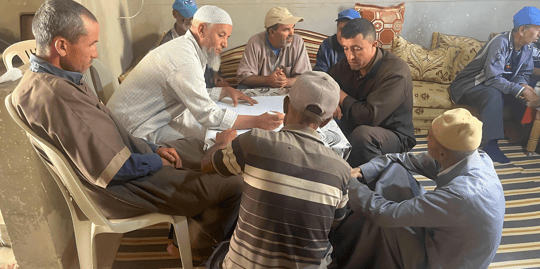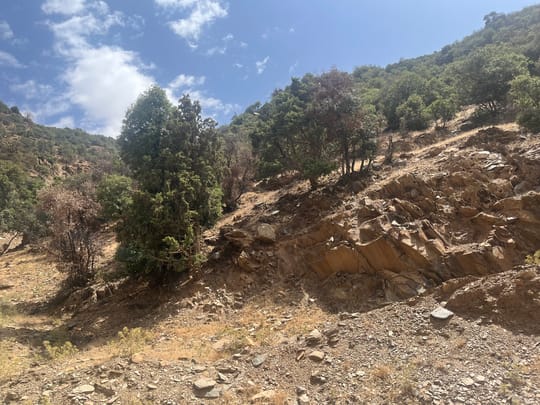Acting for the Future of Aghbar : A step towards Post-Earthquake Sustainable Agriculture

From the 1st to the 2nd of July 2025, the High Atlas Foundation led a mission to Aghbar in the province of Al Haouz, continuing its commitment to post-earthquake reconstruction and the transition to sustainable, resilient agriculture.
This mission is a continuation of the efforts made since the earthquake of September 8, 2023, which hit the provinces of Al Haouz, Azilal, Taroudant, Chichaoua and Ouarzazate hard. The aim is clear: to rebuild, but differently, by laying the foundations for responsible management of natural resources, particularly water and soil.
Why Aghbar?
We are continuing our commitment to the affected areas, with a particular focus on environmental education, sustainable agriculture and strengthening the management of natural resources - water and soil, the pillars of rural life. In Aghbar, we have sought to:
* Train farmers to better manage water in the face of growing water stress.
* Raise awareness of the vital importance of soil maintenance, analysis and amendment for successful and sustainable agricultural production.
* Encourage open dialogue between farmers on local practices and innovative alternatives.
* Initiate a real change in agricultural behaviour in the face of the challenges of climate change.

Two days at the heart of the community
Our team, made up of Mr Ajrinija (FHA Project Manager), Mr Abdelghani (Driver/Logistics) and Mr Didouqen Larbi (Agroecology and Environment Expert), plunged into the heart of the agricultural realities of Aghbar.
Tuesday 1 July 2025:
In the large meeting room of the Aghbar commune, we welcomed farmers from eight douars: Ouidraren, Lamkayat, Zrit, Boughazzir, Anarghi, Tanammert, Ikiss and Igue. The methodology was simple but effective: divide the participants into three teams to discuss agricultural water management and soil protection and enhancement.
What we discovered:
* Limited knowledge of soil constitution, often limited to local terms such as "sandy soil", "rocky soil" and "Tirs" (in the context of Morocco, refers to a type of vertisol soil, a clay-rich, humic, and hydromorphic soils: black soil).
* Only one farmer was using drip irrigation, with the majority still relying on gravity-fed irrigation.
The seeds of change began to germinate:
* After discussions enriched by the contributions of Mr Didouqen Larbi, 40% of the participants said they were ready to adopt drip irrigation!
* And an overwhelming majority, 90%, expressed a desire to carry out a soil analysis. A giant step towards more enlightened agriculture!
Wednesday 2 July 2025 - Douar Ouizammarene
On the second day, we travelled to the douar Ouizammarene, meeting farmers from Ikkissane, Tiouyaline, Imlil and Ouizammarene. Here, the conversation continued on the same themes, with rich exchanges and practical explanations from our expert.
A clear consensus emerged:
* 100% of participants were convinced of the usefulness of soil analysis and the installation of drip irrigation systems!
* Further discussions on climate change and its impact on local agriculture highlighted the need to adapt our behaviour towards natural resources.
The fruits of the mission
More than 45 farmers from various douars were actively involved. The mission was a catalyst for a strong awareness of the challenges of sustainability, a clear openness to new agricultural practices and a strong interest in the next stages of technical support.

Revealing and hopeful findings
The mission revealed some key facts:
- Very few farmers know the composition of their soil; the only local classifications are: sandy soil, rocky soil, and “tirs” (black soil).
- Only one farmer uses drip irrigation; the others rely on traditional gravity-fed systems.
- But the desire to change is there:
** 40% of participants on Day 1 were ready to switch to drip irrigation, and 90% wanted to have their soil analysed.
**100% of the farmers on Day 2 said they were convinced of the importance of these two approaches!
We also discussed climate change: drought, erosion, reduced fertility... all realities that farmers experience on a daily basis. The shared conclusion: we need to change our methods to guarantee the future of our farms.
And now? action on the ground
Building on this momentum, the High Atlas Foundation is proposing an immediate 3-month action plan:
- Carry out soil analyses in interested douars
- Install drip irrigation demonstration sites
- Train people to make compost using local resources
- Distribute simple tools: rudimentary composters, irrigation kits, technical data sheets in Arabic, etc.
- Organise collective feedback to prepare for the next phase in the autumn
In conclusion: A greener future for Aghbar
The mission to Aghbar was much more than just a training course. It was a catalyst for change, raising farmers' awareness of issues that are crucial to post-earthquake resilience: water management, soil health and adaptation to climate change.
The strong demand from farmers for monitoring and technical support confirms that we are on the right track. This is the start of a structured agro-ecological support programme, which we will be building hand in hand with local communities.
This work is only possible thanks to the confidence of the rural communities and their desire to learn, share and take action. In Aghbar, as elsewhere, we believe that the agro-ecological transition is within reach... if it is achieved with and by the farmers themselves.
Thank you to the people of Aghbar for their welcome, their active participation and their willingness to move forward.
The High Atlas Foundation remains at their side, and continues to work with them to sow the seeds of a more resilient future.